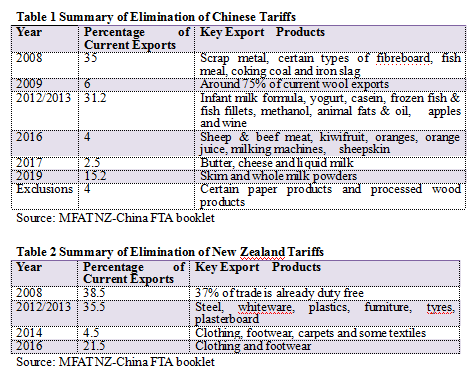

1. CN-NZ FTA:A Win-Win Agreement
(1) Set a high standard in terms of tariff reduction with New Zealand liberalizing 100% of tariff lines and China liberalizing 97% of tariff lines;
(2) Reduced and removed barriers to trade and investment, creating opportunities for businesses to grow their links in each other’s markets;
(3) New Zealand exports to China octupled from around NZ$2.5 billion to NZ$20 billion since the FTA was signed.

2. Upgrade Protocol: Continuing the Story of Mutual Benefit
(1) China and New Zealand agreed in November 2016 to launch upgrade negotiations;
(2) After nine rounds of talk, upgrade negotiations concluded in October 2019;
(3) An Upgrade Protocol was signed in January 2020, containing further market access on trade in goods and services, new commitments on investment and movement of natural persons, improvements to further facilitate bilateral trade, and new areas such as e-Commerce and Environment and Trade;
(4) On April 7th 2022, the Upgrade Protocol comes into force, opening a new chapter for China-New Zealand economic cooperation.
3. Key benefits for New Zealand under the Upgrade Protocol
(1) Improved market access for 12 tariff lines of New Zealand wood and paper products: covering NZ$36 million of current trade to China; duty savings of approximately NZ$1.7 million per year for New Zealand exporters; duty-free access for 99% of New Zealand $3 billion wood and paper trade to China after a ten-year transition period;
(2) Fast-track clearance of perishable goods in the shortest possible time (to the extent possible in less than six hours) and appropriate storage: helping New Zealand exporter of primary products to reduce delays and spoilage;
(3) Enhanced market access for New Zealand services suppliers: new market access to 22 service sectors in China, covering environmental services (nature and landscape protection and other environmental protection services), airport operation service, selling and marketing of air transport services, specialty air services, ground handling services, and audio-visual services (sound recording distribution); improved market access to 17 service sectors in China, covering real estate services, translation and interpretation services, other education services, advertising services, and sport and recreation services.
(4) New chapters of E-Commerce, Environment and Trade, Government Procurement and Competition Policy for future dialogue and cooperation: a demonstration of shared commitment to building sustainable, productive, and rules-based trading system, containing a number of commitments (covering paperless trading, electronic authentication, online consumer protection, procurement transparency, cooperation on trade-related environmental issues, etc.), and establishing mechanisms to facilitate dialogue and cooperation on emerging issues (such as facilitating use of e-commerce by SMEs, the development of cross-border e-commerce goods trade, etc.).